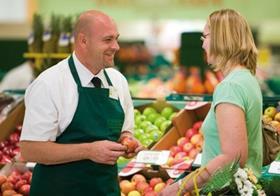
British supermarkets are growing at their fastest rate since June 2014, the latest grocery market share figures from Kantar Worldpanel reveal.
According to data for the 12 weeks ending 26 February 2017, supermarket sales are up 2.3 per cent compared to the same time last year.
Fraser McKevitt, head of retail and consumer insight at the grocery research group, said: “Like-for-like inflation has doubled since last month to stand at 1.4 per cent during the past 12 weeks. However, when placed in their longer-term context, these price increases are still fairly minimal.
“While consumers may be starting to feel a very slight pinch, increased inflation has led to overall market growth,” McKevitt said. “Simultaneously, combined sales at the UK’s four largest supermarkets increased by 0.5 per cent year on year.
“This is a timely reminder that despite the huge interest in the discounters during recent years the big four remain a force to be reckoned with – they still hold just over 70 per cent of the market, with almost 99 per cent of the population shopping in a Tesco, Sainsbury’s, Asda or Morrisons during the latest quarter.”
“Staples such as butter, tea and fish all saw prices rise by more than 5 per cent during the past 12 weeks, as fruit and vegetables – many of which are imported – also saw an uptick in price.
Price inflation has not been universal, however, with prices falling across a number of categories including crisps, bacon and eggs.
Individually, Morrisons grew ahead of the market with a sales increase of 2.6 per cent representing its fastest growth in five years. Maintaining steady year-on-year market share of 10.6 per cent, the retailer’s performance was also strengthened by the continued rapid expansion of its e-commerce business.
Tesco, meanwhile, increased sales for the sixth period in a row – a run it has not experienced since January 2014 – although this wasn’t enough to stop the grocer’s market share slipping by 0.5 percentage points to 27.9 per cent.
Asda was the only retailer to see sales fall during the past 12 weeks, but a decline of just 0.8 per cent represents a significant improvement and is the grocer’s best performance since November 2014.
McKevitt commented: “To the catchy soundtrack of its new ‘food dancing’ advertising campaign, Sainsbury’s returned to growth for the first time since March last year, with sales up by 0.3 per cent. At the same time, its market share slipped by 0.3 percentage points leaving the grocer with 16.5 per cent of the market.”
“Lidl became Britain’s fastest-growing supermarket during the past 12 weeks – with sales up by 13 per cent – while Aldi grew almost as quickly, increasing sales by 12.9 per cent to reach a record market share of 6.3 per cent.
Also growing ahead of the market was Iceland, with sales up 8.8 per cent. Meanwhile Co-op and Waitrose both increased sales by 1.7 pre cent and 2.9 pre cent respectively.
There were signs of changing shopping habits too. Having peaked at just over 40 per cent of sales in 2015, the proportion of groceries sold on promotion continues to decline, falling to 34.3 pre cent during the past 12 weeks – its lowest level since October 2009.
The most dramatic shift has been a move away from multi-buy promotions, with shoppers spending half a billion less on these types of deals than last year.
“Despite the general move away from multi-buys, meal deals remain popular – particularly around Valentine’s Day,' McKevitt said. 'Premium meal deals, which offer dinner for two at a price point of £10 or above, were bought by nearly 2 million consumers in February as Valentine’s Day offered a welcome opportunity to splash out.
“In fact, British diners spent £9 million more on premium meal deals than during the same period last year, suggesting that celebrating special occasions at home is an increasingly appealing option.”






No comments yet